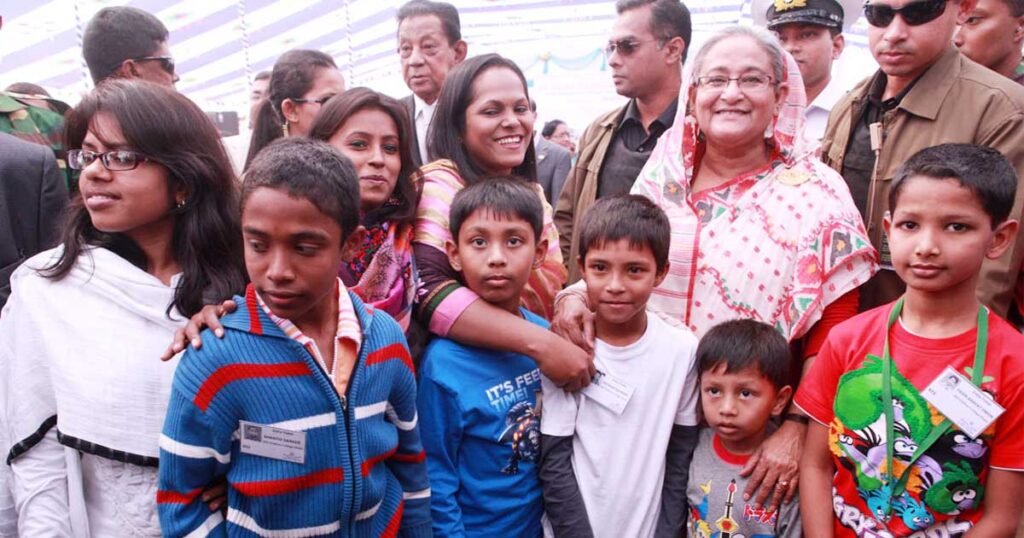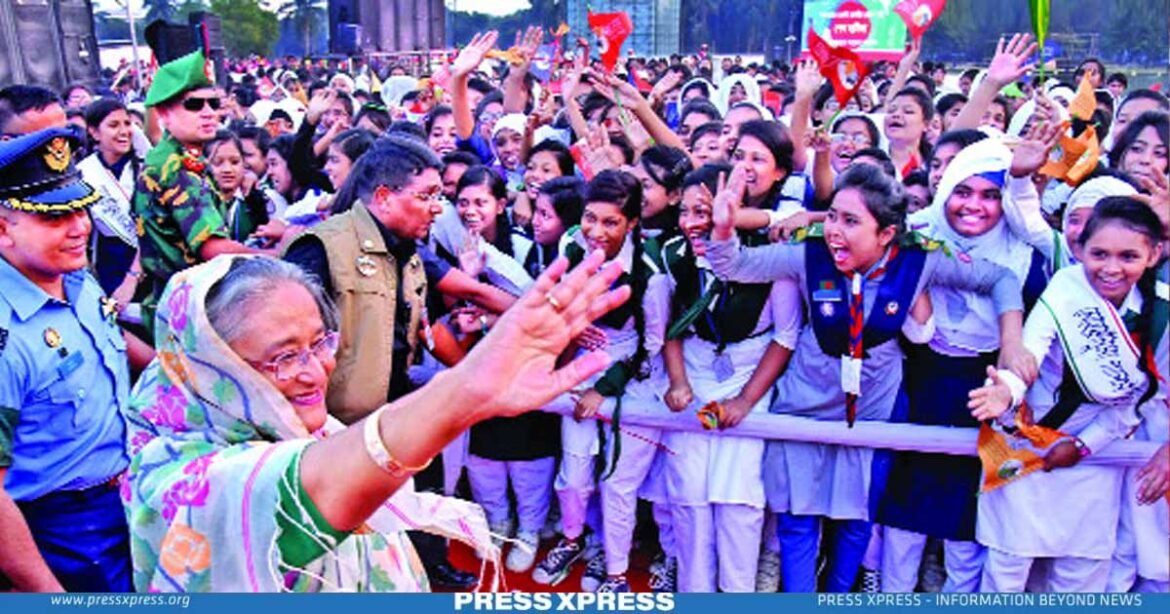In 1974, 15 years prior to the UN’s declaration of the Children’s Rights Charter, Bangladesh enacted the Children’s Act, driven by the visionary leader and Father of the Nation, Bangabandhu Sheikh Mujibur Rahman.
In commemoration of ‘World Children’s Day and Child Rights Week 2023’ on October 2, Prime Minister Sheikh Hasina reiterated her unwavering commitment to providing children with quality education and wholesome entertainment. She emphasized the government’s dedication to nurturing children’s dreams and ensuring their comprehensive development, encompassing their well-being, education, and access to enriching entertainment.
Prime Minister Sheikh Hasina firmly believes that investing in the well-being and growth of children is paramount for securing a brighter future for Bangladesh. She underscored the significance of investing in children, recognizing them as the future architects of the world, and stated, “Invest in children to shape the world’s future.” This highlights the pivotal role children play in driving progress and prosperity.
You can also read: UN Report Reveals 76% of South Asian Children Battling Extreme Heat
In celebration of World Children’s Day and Children’s Rights Week, Bangladesh Shishu Academy, UNICEF, along with national and international children’s organizations and development groups, have collaboratively organized a diverse array of programs and activities.
Child Rights and Ongoing Legacy
Bangladesh stands as a signatory to the United Nations Convention on the Rights of the Child. Remarkably, in 1974, 15 years prior to the UN’s declaration of the Children’s Rights Charter, Bangladesh enacted the Children’s Act, driven by the visionary leader and Father of the Nation, Bangabandhu Sheikh Mujibur Rahman. This visionary leader believed that the cornerstone of a prosperous nation lies in safeguarding and fostering the development of its children, a principle that continues to inspire Bangladesh today.
The Prime Minister highlighted that whenever the Awami League has been in power, it has steadfastly followed the footsteps of Bangabandhu Sheikh Mujibur Rahman, working diligently to safeguard the rights of children. The government has implemented key policies such as the ‘National Child Policy 2011,’ ‘The Child Act 2013,’ and ‘The Prevention of Child Marriage Act 2017.’
Additionally, it has undertaken national and international celebrations dedicated to children, initiated rehabilitation programs for underprivileged children, and established development initiatives for children with special needs.
“The government led by the Awami League has implemented comprehensive measures to promote the well-being of children and equip them to confront future challenges. We are dedicated to ensuring the health, education, and entertainment of our children,” she further stated.
Both the President and the Prime Minister extended their best wishes for the success of all the programs organized to commemorate this day and week.

National Children Policy 2011
In 2011, the National Child Policy was adopted, extending its coverage to all children, regardless of their citizenship status in Bangladesh. The core principles underlying the National Children Policy encompass:
- Safeguarding child rights in accordance with the constitution of Bangladesh, the Child Act, and international treaties and conventions.
- Addressing child poverty and working towards its alleviation.
- Eradicating all manifestations of child abuse and discrimination.
- Eliminating any form of mistreatment and bias against female children.
- participation of children and giving due consideration to their perspectives in the overall protection and welfare of children, ensuring their best interests are paramount, according to ECD Documents.
Child Act 2013
Bangladesh has introduced new legislation, the Children Act of 2013, to benefit its approximately 70 million children, replacing the 1974 Children Act. This new Act, also known as “Shishu Ain, 2013,” aligns with the goal of implementing the United Nations Convention on the Rights of the Child. It received the President’s approval and was published in the Gazette on June 20, 2013. Subsequently, a Gazette notification on August 18, 2013, confirmed that the Act would take effect starting from August 21, 2013.
Prevention of Child Marriage Act 2017
The “Prevention of Child Marriage Act 2017” in Bangladesh is a vital legal framework that aims to combat and prevent child marriages, especially among girls. It includes provisions to raise the legal marriage age, penalize those involved in child marriages, and raise awareness about the harmful consequences of this practice. This Act is instrumental in protecting the rights and future prospects of children in Bangladesh.
Proud Legacy of Achievements
The Prime Minister acknowledged the remarkable talent and intelligence of Bangladeshi children, who have achieved success on the global stage in various competitions and creative endeavors. While the government is committed to preventing child marriage and ensuring the balanced development and protection of children, the Prime Minister emphasized that collective responsibility is crucial. All stakeholders, including parents, families, society, and the state, must play their part in upholding children’s rights. The government remains attentive to the development and well-being of physically and mentally challenged and autistic children.
In the program, the minister called upon all conscientious citizens and parents, as well as government and private organizations, to join hands in fostering the comprehensive development of today’s children. She expressed her belief that these children will lead a developed and prosperous ‘Smart Bangladesh’ by the year 2041.
Universal Children’s Day
The United Nations’ (UN) Universal Children’s Day, which was established in 1954, is celebrated on November 20 each year to promote international togetherness and awareness among children worldwide. UNICEF, the United Nations Children’s Fund, promotes and coordinates this special day, which also works towards improving children’s welfare.
Many countries, including Canada, New Zealand, and the United Kingdom, hold Universal Children’s Day events on November 20 to mark the anniversaries of the Declaration of the Rights of the Child and the Convention on the Rights of the Child.
However, other countries hold events on different dates, such as the fourth Wednesday in October (Australia) and November 14 (India). Universal Children’s Day is not observed in the United States, although a similar observance, National Child’s Day, is held on the first Sunday in June.
In conclusion, since 1990, World Children’s Day has not only commemorated these important declarations but also celebrated children’s rights. It serves as a reminder that individuals from diverse backgrounds, including parents, educators, healthcare providers, government leaders, activists, community members, business leaders, media professionals, and, notably, children themselves, all have pivotal roles in making World Children’s Day meaningful within their societies and communities.


